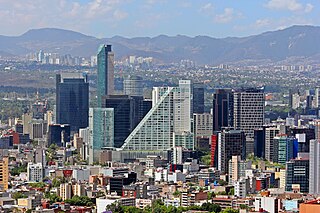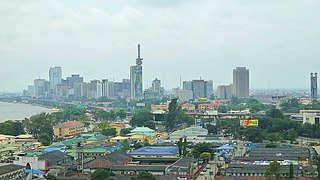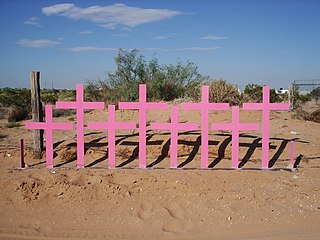Related Research Articles

The economy of Honduras is based mostly on agriculture, which accounts for 14% of its gross domestic product (GDP) in 2013. Leading export coffee (US$340 million) accounted for 22% of total Honduran export revenues. Bananas, formerly the country's second-largest export until being virtually wiped out by 1998's Hurricane Mitch, recovered in 2000 to 57% of pre-Mitch levels. Cultivated shrimp is another important export sector. Since the late 1970s, towns in the north began industrial production through maquiladoras, especially in San Pedro Sula and Puerto Cortés.

The economy of Mexico is a developing market economy. It is the 15th largest in the world in nominal terms and the 11th largest by purchasing power parity, according to the International Monetary Fund. Since the 1994 crisis, administrations have improved the country's macroeconomic fundamentals. Mexico was not significantly influenced by the 2002 South American crisis, and maintained positive, although low, rates of growth after a brief period of stagnation in 2001. However, Mexico was one of the Latin American nations most affected by the 2008 recession with its Gross Domestic Product contracting by more than 6% in that year.

The economy of Nigeria is a middle-income, mixed economy and emerging market, with expanding manufacturing, financial, service, communications, technology and entertainment sectors. It is ranked as the 27th-largest economy in the world in terms of nominal GDP, and the 22nd-largest in terms of purchasing power parity. Nigeria has the largest economy in Africa; its re-emergent manufacturing sector became the largest on the continent in 2013, and it produces a large proportion of goods and services for the West African subcontinent. In addition, the debt-to-GDP ratio is 16.075 percent as of 2019.

The North American Free Trade Agreement is an agreement signed by Canada, Mexico, and the United States, creating a trilateral trade bloc in North America. The agreement came into force on January 1, 1994, and superseded the 1988 Canada–United States Free Trade Agreement between the United States and Canada. The NAFTA trade bloc is one of the largest trade blocs in the world by gross domestic product.
A tariff is a tax on imports or exports between sovereign states. It is a form of regulation of foreign trade and a policy that taxes foreign products to encourage or safeguard domestic industry. Traditionally, states have used them as a source of income. Now, they are among the most widely used instruments of protectionism, along with import and export quotas.

Free trade is a trade policy that does not restrict imports or exports. It can also be understood as the free market idea applied to international trade. In government, free trade is predominantly advocated by political parties that hold liberal economic positions while economically left-wing and nationalist political parties generally support protectionism, the opposite of free trade.

A maquiladora ([makilaˈðoɾa]), or maquila, is a company that allows factories to be largely duty free and tariff-free. These factories take raw materials and assemble, manufacture, or process them and export the finished product. These factories and systems are present throughout Latin America, including Mexico, Paraguay, Nicaragua, and El Salvador. Maquiladoras date back to 1964, when the Mexican government introduced the Programa de Industrializacion Fronteriza (BIP). Specific programs and laws have made Mexico’s maquila industry grow rapidly.

The phenomenon of the female homicides in Ciudad Juárez, called in Spanish feminicidio ("feminicide") involves the violent deaths of hundreds of women and girls since 1993 in the northern Mexican region of Ciudad Juárez, Chihuahua, a border city across the Rio Grande from the U.S. city of El Paso, Texas. As of February 27, 2005, the number of murdered women in Ciudad Juárez since 1993 is estimated to be more than 370.
The Mexican peso crisis was a currency crisis sparked by the Mexican government's sudden devaluation of the peso against the U.S. dollar in December 1994, which became one of the first international financial crises ignited by capital flight.
The economic policies of Bill Clinton, referred to by some as Clintonomics, encapsulates the economic policies of United States President Bill Clinton that were implemented during his presidency, which lasted from January 1993 to January 2001.

The G-3 was a free trade agreement between Colombia, Mexico, and Venezuela that came into effect on January 1, 1995, which created an extended market of 149 million consumers with a combined GDP of US$486.5 billion. The agreement states a ten percent tariff reduction over ten years for the trade of goods and services among its members. The agreement is a third generation one, not limited to liberalizing trade, but includes issues such as investment, services, government purchases, regulations to fight unfair competition, and intellectual property rights.
This article was written in 2008 with partial updates at later dates, including most recently in 2011. Please update it further.
North American Free Trade Agreement's impact on United States employment has been the object of ongoing debate since the 1994 inception of the North American Free Trade Agreement (NAFTA) with Canada and Mexico. NAFTA's proponents believe that more jobs were ultimately created in the USA. Opponents see the agreements as having been costly to well-paying American jobs.
The U.S. Sugar program is the federal commodity support program that maintains a minimum price for sugar, authorized by the 2002 farm bill to cover the 2002-2007 crops of sugar beets and sugarcane.

Beginning early in the 20th century, Monterrey, Mexico began a successful economic metamorphosis and growth pattern that remains an exception in Mexico. This all began with increased investments in irrigation that fueled a boom in agriculture and ranching for this northern Mexican city. The economic growth has fueled income disparity for the 3.86 million residents who live in the Monterrey Metro area (MMA). In addition, the rapid urbanization has taken a large toll on the water resources. In addressing many of this challenges, the city of Monterrey has become a model for sound and effective Integrated urban water management.
Since 1970s, there has been on going trade disputes between Mexico against the United States. The complaints were taken to General Agreement on Tariffs and Trade (GATT) committee and it's 1995 successor; the World Trade Organization (WTO). The case became know as Tuna-Dolphin I, Tuna-Dolphin II and US-Tuna II (Mexico). Complaints where over the US's embargoes on yellowfin tuna and yellowfin tuna product imports that use purse-seine fishing methods and the labeling there of. Purse-seine fishing has resulted in a high number of dolphin kills.

Gender inequality can be found in various areas of Salvadoran life such as employment, health, education, political participation, and family life. Although women in El Salvador enjoy equal protection under the law, they are often at a disadvantage relative to their male counterparts. In the area of politics, women have the same rights as men, but the percentage of women in office compared to men is low. Though much progress has been made since the Salvadoran Civil War ended in 1992, women in El Salvador still face gender inequality.
Protective tariffs are tariffs that are enacted with the aim of protecting a domestic industry. They aim to make imported goods cost more than equivalent goods produced domestically, thereby causing sales of domestically produced goods to rise; supporting local industry. Tariffs are also imposed in order to raise government revenue, or to reduce an undesirable activity. Although a tariff can simultaneously protect domestic industry and earn government revenue, the goals of protection and revenue maximization suggest different tariff rates, entailing a tradeoff between the two aims.

The Agreement between the United States of America, the United Mexican States, and Canada is a signed but not ratified free trade agreement between Canada, Mexico, and the United States.
Brooms manufactured from broomcorn became specifically subject to an increase in US import tariffs in 1996. In response to the US action, chief exporter of broomcorn brooms Mexico requested dispute settlement from an arbitration tribunal of NAFTA, which eventually decided in Mexico's favor. It was one of only three cases to be decided under the provisions of Chapter 20 of NAFTA.
References
- ↑ Irish, Maureen (2004). The auto pact: investment, labour, and the WTO. Kluwer Law International. p. 139. ISBN 90-411-2231-1.